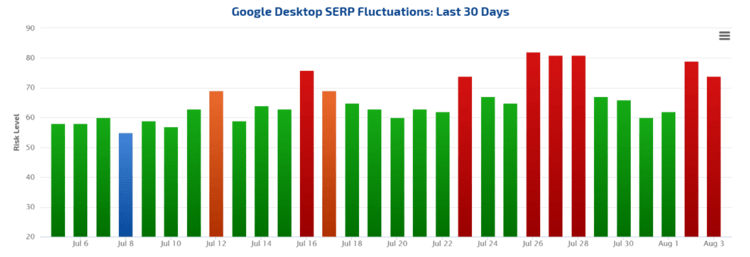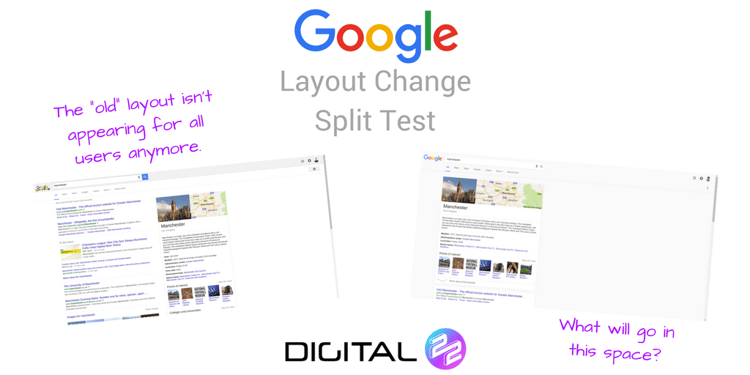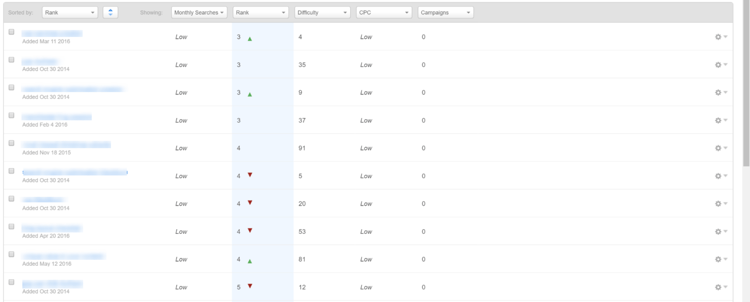Nothing has been confirmed in terms of any Google algorithm update, but there has been some reshuffling of the pack when it comes to their search engine results page.

Danielle, an SEO Consultant in our team, alerted us to an awful lot of talk about a double week of updates to Google's algorithm and we have done some digging. It appears the only confirmed news is that something is going on.
In short, general consensus seems to be that there was definitely an update last week, but opinion is split on whether last week's changes have been reversed, an additional change has been added, or even whether it was just a test.
What sparked the interest was marketers around the world have noticed that their ranking positions have fluctuated over the past week and analysis sites have documented a few spikes of activity.
Here's some from RankRanger:

You may have noticed the visual layout change to Google's desktop results page to a more card-based layout, akin to mobile. But some only to some users. Knowledge graph is also solely in the top result placing, not additionally to the side too. Ads, knowledge graph and news break up organice results more inconsistently and less predictably too. Check out what's going on on Google - you can see how each result is awarded its own card slot - if you are part of the testing.

There was also the launch of expanded text ads at the end of July, which is another big change. The expanded ads are on the left and the pre-rollout legacy ad is second down on the right:

Here's a few more recent-ish big changes which provide opportunities for SEO.

And the great UX offered by AMP news stories in an ever-more mobile world means that this setup should reach Google Shopping soon.

All of these changes really boost the user's experience - something which Google says is their ultimate improvement goal.
They speed up query resolution and load speed. They show things visually and the increasing semantic understanding of Google means that the results (should) be more and more relevant. But all of these layout changes mean that organic results are getting less and less prominent.
Back to the algorithm changes - which we have to assume are being tweaked as part of this wider strategy to improve usability and change the way Google appears to users. Both the layout and algorithm changing has an impact on SEO practice.
Across the SEO blogs and forums, marketers have reported jumps, falls and returns to original positions over the past week, across various types of sites and locations.
Looking at our own keyword performance for the previous week and the week before, it's a mixed bag.

There isn't really much to report here apart from we have gained one more low volume keyword top ranking.

Moving down our rankings a little, we are still on the same page but for every movement upwards, there is roughly the same amount of movement downwards. Both of these types of movement reports are typical as you track through our keyword reports.
It's worth noting here that they are mostly longtail keywords and that they are blurred just to avoid giving away anything potentially confidential.
Discussing this in the office, beyond a generally interesting chat about SEO and Google, what we are ultimately concerned with is how all this affects traffic.
After a week, we haven't seen any noticeable changes to page views but it's still early days when there seems to be big changes afoot.
It is just something worth noting and making sure we all learn what Google's new rules are.
Knowledge Is The Key To Success
Making sure you have the full picture is the start of a successful marketing strategy. After that, knowing how to utilise that knowledge and improve your inbound marketing strategy is the next step.
If you'd like to get some actionable and thorough advice on a wide range of inbound marketing techniques, download our new, free 50-page eBook.
Real Growth. Real Impact.
Time to rethink your whole SEO and content marketing strategy
Why it's vital and how to start building customer-led sales and marketing
How is AI disturbing Google search results and what can you do about it
How to avoid over optimising your website with Hannah Wilson, SEO Specialist
Google Search API leaks: All you need to know [LIVE BLOG]
Choosing between a HubSpot Partner and an SEO-specific agency
What's happening with Google SGE and what should we do?
See why enterprises choose Avidly
Let’s build your HubSpot success story
Compelling final call to action - with accompanying link to Contact page





![Google Search API leaks: All you need to know [LIVE BLOG]](https://www.avidlyagency.com/hs-fs/hubfs/cloud.jpg?width=400&height=225&name=cloud.jpg)


